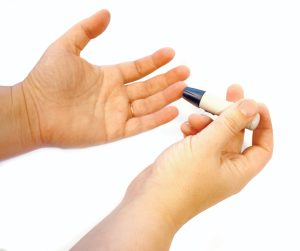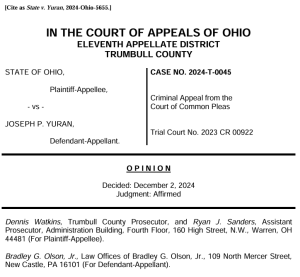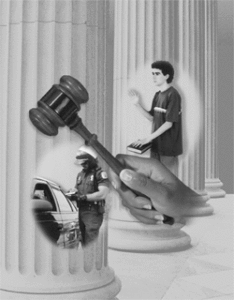 A previous article in this blog discussed the potential impact of hypoglycemia (low blood sugar) on an investigation for DUI (called ‘OVI’ in Ohio). Hypoglycemia is not the only blood sugar condition which may affect an OVI investigation. Hyperglycemia (high blood sugar) may also cause symptoms which overlap with the symptoms of alcohol intoxication. In addition, hyperglycemia may inflate the results of a breath alcohol test.
A previous article in this blog discussed the potential impact of hypoglycemia (low blood sugar) on an investigation for DUI (called ‘OVI’ in Ohio). Hypoglycemia is not the only blood sugar condition which may affect an OVI investigation. Hyperglycemia (high blood sugar) may also cause symptoms which overlap with the symptoms of alcohol intoxication. In addition, hyperglycemia may inflate the results of a breath alcohol test.
Articles Tagged with OVI
Former Trooper Appeals Sentence for Vehicular Homicide
 A former Pennsylvania state trooper was involved in a two-vehicle automobile crash, and the driver of the other vehicle died as a result. The former trooper, Joseph Yuran, was charged with Aggravated Vehicular Homicide as a second-degree felony and Operating a Vehicle under the Influence (OVI). Yuran pled guilty to those charges, and the judge imposed a prison term of 7 years to 10.5 years. Yuran appealed the sentence to the 11th District Court of Appeals, claiming the sentence was unlawful.
A former Pennsylvania state trooper was involved in a two-vehicle automobile crash, and the driver of the other vehicle died as a result. The former trooper, Joseph Yuran, was charged with Aggravated Vehicular Homicide as a second-degree felony and Operating a Vehicle under the Influence (OVI). Yuran pled guilty to those charges, and the judge imposed a prison term of 7 years to 10.5 years. Yuran appealed the sentence to the 11th District Court of Appeals, claiming the sentence was unlawful.
Ohio DUI/OVI Law Set to Change
 The law governing DUI (called ‘OVI’ in Ohio) is going to change. House Bill 37, signed by Governor Mike DeWine, becomes law on April 9, 2025. The legislation changes four separate areas of law: (1) Driving privileges and ignition interlock devices for OVI license suspensions; (2) Financial penalties for OVI convictions; (3) Oral fluid testing in OVI cases; and (4) Aggravated Vehicular Homicide penalties when a defendant has prior OVI convictions. This article addresses the changes in that order.
The law governing DUI (called ‘OVI’ in Ohio) is going to change. House Bill 37, signed by Governor Mike DeWine, becomes law on April 9, 2025. The legislation changes four separate areas of law: (1) Driving privileges and ignition interlock devices for OVI license suspensions; (2) Financial penalties for OVI convictions; (3) Oral fluid testing in OVI cases; and (4) Aggravated Vehicular Homicide penalties when a defendant has prior OVI convictions. This article addresses the changes in that order.
Seminar: Negotiations in DUI / OVI Cases
 Many continuing legal education seminars teach the art of trial skills. In the area of DUI (called ‘OVI’ in Ohio), fewer than five percent of cases go to trial, but 100% of cases involve negotiation. For the first time, the National College for DUI Defense (NCDD) held a seminar to improve negotiation skills. The presentations provided valuable insight, and three of them stood-out to me.
Many continuing legal education seminars teach the art of trial skills. In the area of DUI (called ‘OVI’ in Ohio), fewer than five percent of cases go to trial, but 100% of cases involve negotiation. For the first time, the National College for DUI Defense (NCDD) held a seminar to improve negotiation skills. The presentations provided valuable insight, and three of them stood-out to me.
Investigation: Hundreds of Sober Drivers Charged With DUI
 The city of Goodlettsville recently settled with a driver who was wrongfully charged with DUI (called ‘OVI’ in Ohio). The settlement was reported by a local television station which conducted an investigation into sober drivers charged with DUI. The investigation revealed the driver in Goodlettsville was one of hundreds charged with DUI and later exonerated by forensic testing.
The city of Goodlettsville recently settled with a driver who was wrongfully charged with DUI (called ‘OVI’ in Ohio). The settlement was reported by a local television station which conducted an investigation into sober drivers charged with DUI. The investigation revealed the driver in Goodlettsville was one of hundreds charged with DUI and later exonerated by forensic testing.
Child Endangering and DUI/OVI in Ohio
 This blog is not a bar band: we take requests without asking for tips! Yesterday, we received a question from a reader who wants to understand the interplay of Child Endangering and DUI (called ‘OVI’ in Ohio). This article is going to answer that reader’s question. Ask and you shall receive.
This blog is not a bar band: we take requests without asking for tips! Yesterday, we received a question from a reader who wants to understand the interplay of Child Endangering and DUI (called ‘OVI’ in Ohio). This article is going to answer that reader’s question. Ask and you shall receive.
Vegas DUI Seminar: Successful Strategies from the Masters of DUI Defense
 The Vegas DUI seminar presented by NCDD and NACDL always rekindles my passion for DUI defense (called ‘OVI’ in Ohio). This year, I went with my associate Bryan Hawkins. Although we have both presented at many seminars, there is always more to learn, and we each felt like there were many useful take-aways from the presentations. The presentations were all good, and there were three which were especially noteworthy.
The Vegas DUI seminar presented by NCDD and NACDL always rekindles my passion for DUI defense (called ‘OVI’ in Ohio). This year, I went with my associate Bryan Hawkins. Although we have both presented at many seminars, there is always more to learn, and we each felt like there were many useful take-aways from the presentations. The presentations were all good, and there were three which were especially noteworthy.
Juvenile DUI / OVI in Ohio
 A recent news story reported the arrest of a 14-year-old boy for DUI (called ‘OVI’ in Ohio). It is somewhat unusual for a juvenile to be charged with OVI in Ohio. When a juvenile faces an OVI case, some aspects are the same as adult OVIs and some components are different. Those components include the investigation, the court process, and the penalties.
A recent news story reported the arrest of a 14-year-old boy for DUI (called ‘OVI’ in Ohio). It is somewhat unusual for a juvenile to be charged with OVI in Ohio. When a juvenile faces an OVI case, some aspects are the same as adult OVIs and some components are different. Those components include the investigation, the court process, and the penalties.
U.S. Supreme Court Addresses Right to Confront Crime Lab Analyst
 In DUI cases (called ‘OVI’ in Ohio), a defendant’s blood or urine sample may be tested by a crime lab to determine the concentration of alcohol and/or drugs in the sample. In court, a lab analyst testifies regarding the blood or urine testing and the results of the test. But what if the analyst testifying is not the analyst who conducted the test? The recent case of Smith v. Arizona addressed whether this violates the defendant’s right to confront witnesses.
In DUI cases (called ‘OVI’ in Ohio), a defendant’s blood or urine sample may be tested by a crime lab to determine the concentration of alcohol and/or drugs in the sample. In court, a lab analyst testifies regarding the blood or urine testing and the results of the test. But what if the analyst testifying is not the analyst who conducted the test? The recent case of Smith v. Arizona addressed whether this violates the defendant’s right to confront witnesses.
Can a Driver Arrested for DUI/OVI Revoke Consent to a Blood Test?

When an officer arrests a driver for DUI (called ‘OVI’ in Ohio), the officer typically requests that the driver consent to a blood, breath, or urine test. However, a statute in the Ohio Revised Code (section 4511.191) says a driver arrested for OVI implicitly consents to those tests. Can a driver arrested for OVI revoke that consent? This question has not been directly addressed in Ohio but was recently answered by the Supreme Court of Colorado.
 Columbus OVI/DUI Attorney Blog
Columbus OVI/DUI Attorney Blog

